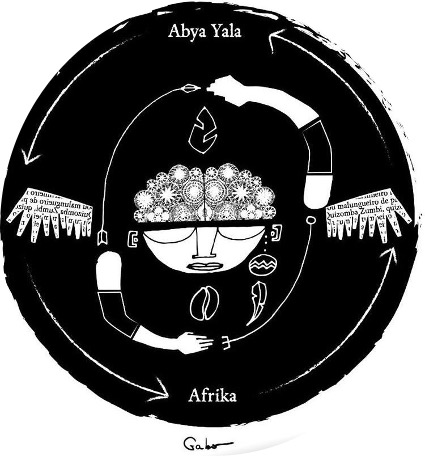"The dead don't know how much a coffin costs"
Afro realism in haitian literature
Keywords:
sociology of literature, afro realism, zumbification, haitian literatureAbstract
The conception of the literary fact as a social fact (SAPIRO, 2016) legitimized sociological research together with works of literature, mainly for the reason that the literary form operates as an aesthetic expression of material life. In the light of historical and dialectical materialism, this article challenges the concept of zumbification developed in memorable works of Haitian literature, such as “Adriana em todos os meus sonhos” (DEPESTRE, 1996), “Pau de Sebo” (DEPESTRE, 1983) and “País sem Chapéu” ( LAFERRIÈRE, 2011). Such conceptual notion expresses particularities of the literary realism inherent to Haitian writers who, between the cracks of the literate city (RAMA, 2015), affirmed voodoo and orality as phenomena that organize the sociability of the Caribbean country. In this way, we resort to the idea of afrorrealism (DUNCAN, 2006), with regard to the aesthetic debate of the selected texts, and to the concept of capitalist realism (FISHER, 2020), to formulate a critical reflection on the contributions of Haitian authored literature, in general, and the notion of zumbification, in particular, together with the sociology studies of literature.
Downloads
References
ARTEL, Jorge. Tambores en la noche. Bogotá: Ministerio de Cultura, 2010.
BARBOSA, Wilson do Nascimento; SANTOS, Joel Rufino. Atrás do muro da noite: dinâmica das culturas afro-brasileiras. Brasília: Fundação Cultural Palmares, 1994.
CARLI, Ranieri. A estética de György Lukács e o triunfo do realismo na literatura. Rio de Janeiro: Editora UFRJ, 2012.
CÉSAIRE, Aimé. Discurso sobre o colonialismo. São Paulo: Veneta, 2020.
CÉSAIRE, Aimé. Discurso sobre a negritude. Belo Horizonte: Nandyala, 2010.
DEPESTRE, René. Adriana em todos os meus sonhos. Rio de Janeiro: Nova Fronteira, 1996.
DEPESTRE, René. Buenos días y adiós a la negritud. Habana: Casa de Las Américas, 1986.
DEPESTRE, René. Pau de Sebo. Rio de Janeiro: Marco Zero, 1983.
DUNCAN, Quince. El afrorrealismo: una nueva dimensión de la literatura latinoamericana. Habana: La Jiribilla, 2006. Disponível em: http://www.lajiribilla.co.cu/2006/n272_07/272_06.html Acesso em: 29 mar. 2021.
FISHER, Mark. Realismo capitalista: é mais fácil imaginar o fim do mundo do que o fim do capitalismo? São Paulo: Autonomia Literária, 2020.
KONDER, Leandro. Os marxistas e a arte: breve estudo histórico-crítico de algumas tendências da estética marxista. Rio de Janeiro: Civilização Brasileira, 1967.
LAFERRIÈRE, Dany. País sem chapéu. São Paulo: Editora 34, 2011.
LUKÁCS, György. Marx e Engels como historiadores da literatura. São Paulo: Boitempo, 2016.
MARX, Karl; ENGELS, Friedrich. Sobre literatura e arte. Lisboa: Editorial Estampa, 1971.
MOURA, Clóvis. Sociologia do negro brasileiro. São Paulo: Editora Ática, 1988.
RAMA, Ángel. A cidade das letras. São Paulo: Boitempo, 2015.
SAPIRO, Gisèle. La sociologia de la literatura. Ciudad Autónoma de Buenos Aires: Fondo de Cultura Económica, 2016.
SENGHOR, Léopold Sédar. O contributo do homem negro. In: SANCHES, Manuela Ribeiro. Malhas que os impérios tecem: textos anticoloniais, contextos pós-coloniais. Lisboa: Edições 70, 2011. Pg. 73-92.
SENGHOR, Léopold Sédar. Um caminho do socialismo. Rio de Janeiro: Record, 1965.
SODRÉ, Muniz. A verdade seduzida. Rio de Janeiro: Francisco Alves Editora, 1988.
Downloads
Published
How to Cite
Issue
Section
License
Copyright (c) 2021 Communitas

This work is licensed under a Creative Commons Attribution-NonCommercial-ShareAlike 4.0 International License.
The Copyright for articles published in this magazine belongs to the author, preserving the rights of first publication for the Communitas Magazine. Because they appear in this publicly accessible journal, the articles are free to use, with their own attributions, in educational and non-commercial applications.
























